非谓语动词与动词辨析
- 格式:doc
- 大小:37.50 KB
- 文档页数:2
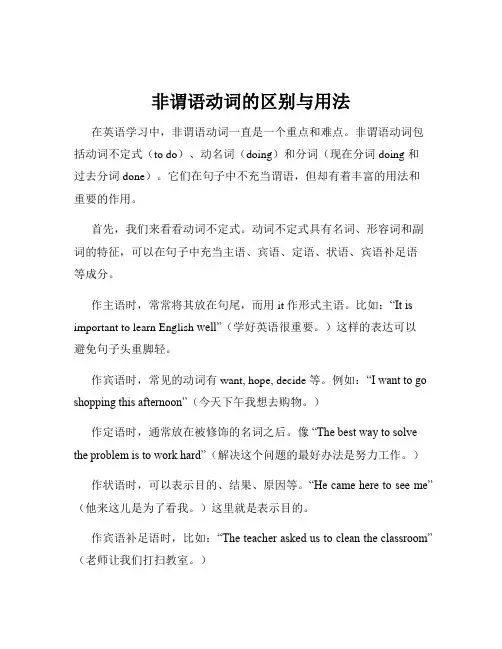
非谓语动词的区别与用法在英语学习中,非谓语动词一直是一个重点和难点。
非谓语动词包括动词不定式(to do)、动名词(doing)和分词(现在分词 doing 和过去分词 done)。
它们在句子中不充当谓语,但却有着丰富的用法和重要的作用。
首先,我们来看看动词不定式。
动词不定式具有名词、形容词和副词的特征,可以在句子中充当主语、宾语、定语、状语、宾语补足语等成分。
作主语时,常常将其放在句尾,而用 it 作形式主语。
比如:“It is important to learn English well”(学好英语很重要。
)这样的表达可以避免句子头重脚轻。
作宾语时,常见的动词有 want, hope, decide 等。
例如:“I want to go shopping this afternoon”(今天下午我想去购物。
)作定语时,通常放在被修饰的名词之后。
像“The best way to solve the problem is to work hard”(解决这个问题的最好办法是努力工作。
)作状语时,可以表示目的、结果、原因等。
“He came here to see me”(他来这儿是为了看我。
)这里就是表示目的。
作宾语补足语时,比如:“The teacher asked us to clean the classroom”(老师让我们打扫教室。
)接下来是动名词。
动名词具有名词的特征,在句中可以充当主语、宾语、定语等成分。
作主语时,谓语动词要用单数形式。
例如:“Swimming is good for your health”(游泳对你的健康有好处。
)作宾语时,常见的动词有 enjoy, finish, practice 等。
比如:“I enjoy reading book s in my spare time”(我业余时间喜欢读书。
)作定语时,通常表示被修饰词的用途。
“A swimming pool”(游泳池),这里的“swimming”就表示“pool”的用途。
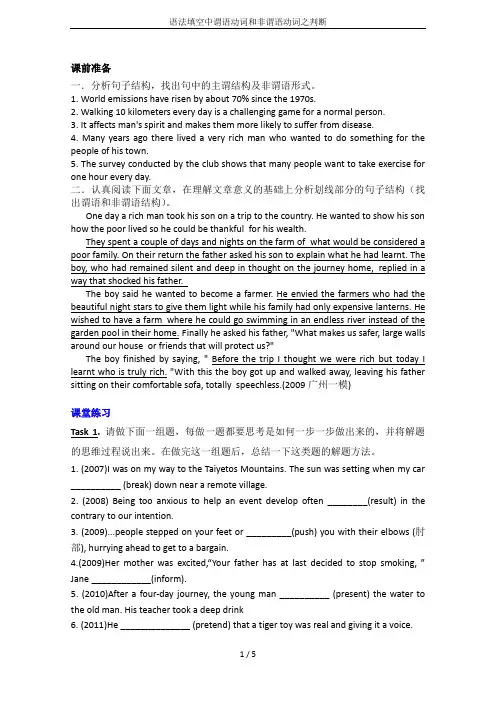
课前准备一.分析句子结构,找出句中的主谓结构及非谓语形式。
1. World emissions have risen by about 70% since the 1970s.2. Walking 10 kilometers every day is a challenging game for a normal person.3. It affects man's spirit and makes them more likely to suffer from disease.4. Many years ago there lived a very rich man who wanted to do something for the people of his town.5. The survey conducted by the club shows that many people want to take exercise for one hour every day.二.认真阅读下面文章,在理解文章意义的基础上分析划线部分的句子结构(找出谓语和非谓语结构)。
One day a rich man took his son on a trip to the country. He wanted to show his son how the poor lived so he could be thankful for his wealth.They spent a couple of days and nights on the farm of what would be considered a poor family. On their return the father asked his son to explain what he had learnt. The boy, who had remained silent and deep in thought on the journey home, replied in a way that shocked his father.The boy said he wanted to become a farmer. He envied the farmers who had the beautiful night stars to give them light while his family had only expensive lanterns. He wished to have a farm where he could go swimming in an endless river instead of the garden pool in their home. Finally he asked his father, "What makes us safer, large walls around our house or friends that will protect us?"The boy finished by saying, " Before the trip I thought we were rich but today I learnt who is truly rich. "With this the boy got up and walked away, leaving his father sitting on their comfortable sofa, totally speechless.(2009广州一模)课堂练习Task 1. 请做下面一组题,每做一题都要思考是如何一步一步做出来的,并将解题的思维过程说出来。
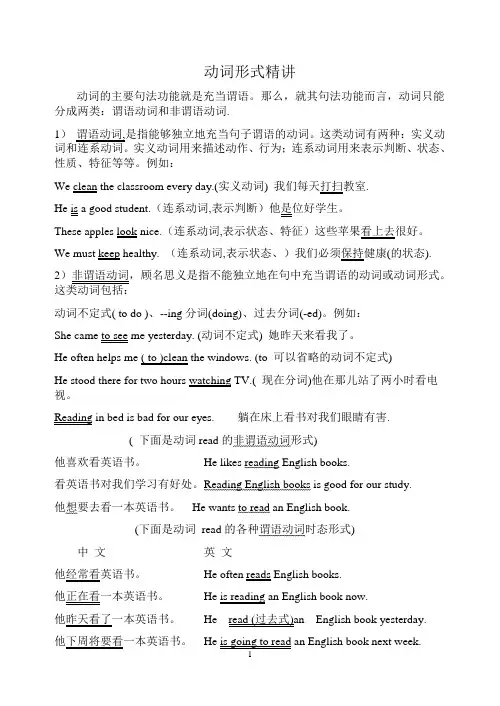
动词形式精讲动词的主要句法功能就是充当谓语。
那么,就其句法功能而言,动词只能分成两类:谓语动词和非谓语动词.1)谓语动词,是指能够独立地充当句子谓语的动词。
这类动词有两种:实义动行为;连系动词用来表示判断、状态、性质、特征等等。
例如:We clean the classroom every day.(实义动词) 我们每天打扫教室.He is a good student.(连系动词,表示判断)他是位好学生。
These apples look nice.(连系动词,表示状态、特征)这些苹果看上去很好。
We must keep healthy. (连系动词,表示状态、)我们必须保持健康(的状态). 2)非谓语动词,顾名思义是指不能独立地在句中充当谓语的动词或动词形式。
动词不定式( to do )、--ing分词(doing)、过去分词(-ed)。
例如:She came to see me yesterday. (动词不定式) 她昨天来看我了。
He often helps me ( to )clean the windows. (to 可以省略的动词不定式)He stood there for two hours watching TV.( 现在分词)他在那儿站了两小时看电视。
Reading in bed is bad for our eyes. 躺在床上看书对我们眼睛有害.( 下面是动词read的非谓语动词形式)他喜欢看英语书。
He likes reading English books.看英语书对我们学习有好处。
Reading English books is good for our study.他想要去看一本英语书。
He wants to read an English book.(下面是动词read的各种谓语动词时态形式)中文英文他经常看英语书。
He often reads English books.他正在看一本英语书。
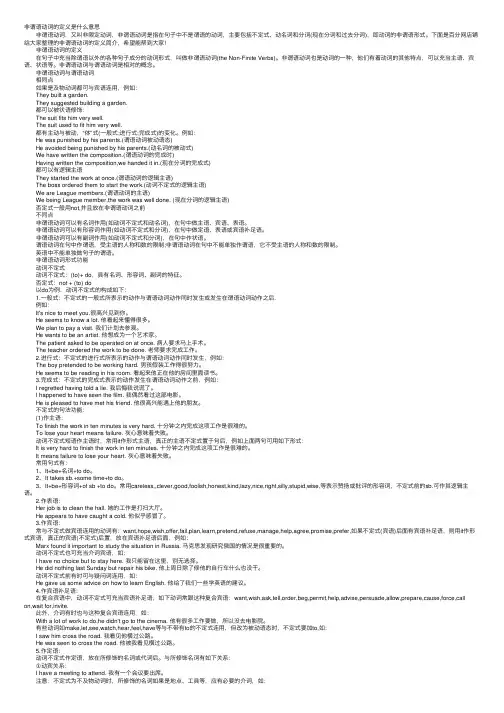
⾮谓语动词的定义是什么意思 ⾮谓语动词,⼜叫⾮限定动词,⾮谓语动词是指在句⼦中不是谓语的动词,主要包括不定式、动名词和分词(现在分词和过去分词),即动词的⾮谓语形式。
下⾯是百分⽹店铺给⼤家整理的⾮谓语动词的定义简介,希望能帮到⼤家! ⾮谓语动词的定义 在句⼦中充当除谓语以外的各种句⼦成分的动词形式,叫做⾮谓语动词(the Non-Finite Verbs)。
⾮谓语动词也是动词的⼀种,他们有着动词的其他特点,可以充当主语、宾语、状语等。
⾮谓语动词与谓语动词是相对的概念。
⾮谓语动词与谓语动词 相同点 如果是及物动词都可与宾语连⽤,例如: They built a garden. They suggested building a garden. 都可以被状语修饰: The suit fits him very well. The suit used to fit him very well. 都有主动与被动,“体”式(⼀般式;进⾏式;完成式)的变化。
例如: He was punished by his parents.(谓语动词被动语态) He avoided being punished by his parents.(动名词的被动式) We have written the composition.(谓语动词的完成时) Having written the composition,we handed it in.(现在分词的完成式) 都可以有逻辑主语 They started the work at once.(谓语动词的逻辑主语) The boss ordered them to start the work.(动词不定式的逻辑主语) We are League members.(谓语动词的主语) We being League member,the work was well done. (现在分词的逻辑主语) 否定式⼀般⽤not,并且放在⾮谓语动词之前 不同点 ⾮谓语动词可以有名词作⽤(如动词不定式和动名词),在句中做主语、宾语、表语。
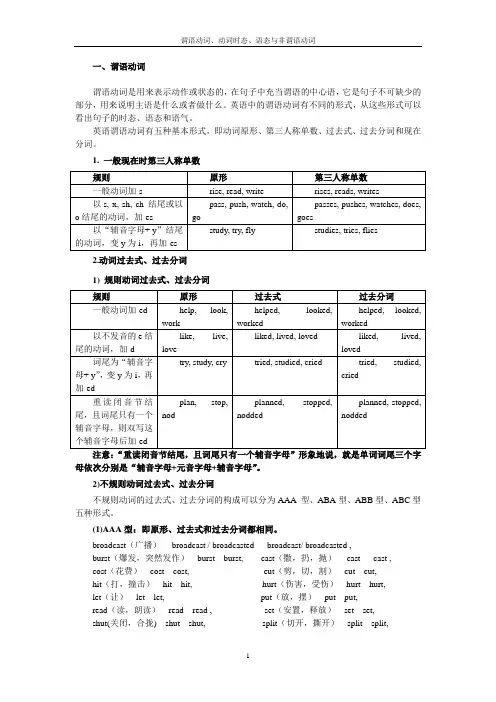
一、谓语动词谓语动词是用来表示动作或状态的,在句子中充当谓语的中心语,它是句子不可缺少的部分,用来说明主语是什么或者做什么。
英语中的谓语动词有不同的形式,从这些形式可以看出句子的时态、语态和语气。
英语谓语动词有五种基本形式,即动词原形、第三人称单数、过去式、过去分词和现在分词。
1. 一般现在时第三人称单数2.动词过去式、过去分词1) 规则动词过去式、过去分词注意:“重读闭音节结尾,且词尾只有一个辅音字母”形象地说,就是单词词尾三个字母依次分别是“辅音字母+元音字母+辅音字母”。
2)不规则动词过去式、过去分词不规则动词的过去式、过去分词的构成可以分为AAA 型、ABA型、ABB型、ABC型五种形式。
(1)AAA型:即原形、过去式和过去分词都相同。
broadcast(广播)--- broadcast / broadcasted --- broadcast/ broadcasted ,burst(爆发,突然发作)---burst---burst, cast(撒,扔,抛)--- cast --- cast ,cost(花费)---cost---cost, cut(剪,切,割)---cut---cut,hit(打,撞击)---hit---hit, hurt(伤害,受伤)---hurt---hurt,let(让)---let---let, put(放,摆)---put---put,read(读,朗读)---read---read , set(安置,释放)---set---set,shut(关闭,合拢)---shut---shut, split(切开,撕开)---split---split,spread(展开,延伸)---spread---spread注意:read---read---read发音分别是[ri:d]---[red]---[red],其余动词三式读音相同。
(2)ABA型:即动词的过去分词与原形是一样的。
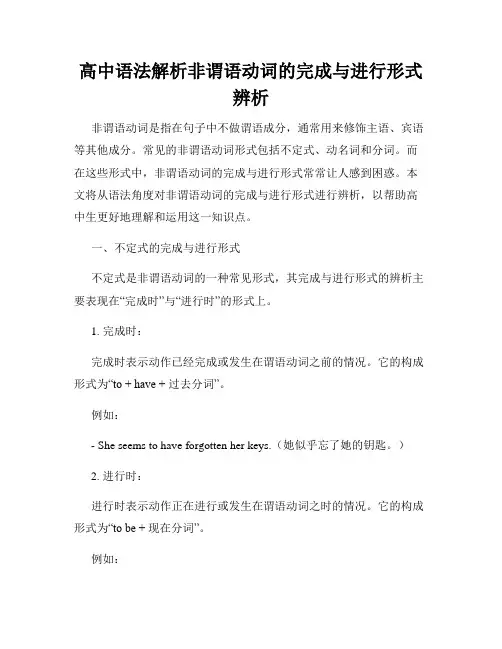
高中语法解析非谓语动词的完成与进行形式辨析非谓语动词是指在句子中不做谓语成分,通常用来修饰主语、宾语等其他成分。
常见的非谓语动词形式包括不定式、动名词和分词。
而在这些形式中,非谓语动词的完成与进行形式常常让人感到困惑。
本文将从语法角度对非谓语动词的完成与进行形式进行辨析,以帮助高中生更好地理解和运用这一知识点。
一、不定式的完成与进行形式不定式是非谓语动词的一种常见形式,其完成与进行形式的辨析主要表现在“完成时”与“进行时”的形式上。
1. 完成时:完成时表示动作已经完成或发生在谓语动词之前的情况。
它的构成形式为“to + have + 过去分词”。
例如:- She seems to have forgotten her keys.(她似乎忘了她的钥匙。
)2. 进行时:进行时表示动作正在进行或发生在谓语动词之时的情况。
它的构成形式为“to be + 现在分词”。
例如:- He pretended to be working when his boss entered the office.(当他的老板走进办公室时,他假装正在工作。
)二、动名词的完成与进行形式动名词是非谓语动词的另一种常见形式,其完成与进行形式的辨析主要在于完成时的构成形式。
1. 完成时:完成时表示动作已经完成或发生在谓语动词之前的情况。
它的结构为“现在分词 + having + 过去分词”。
例如:- Having finished her homework, she went to bed.(她做完功课后上床睡觉了。
)2. 进行时:进行时表示动作正在进行或发生在谓语动词之时的情况。
它的构成形式为“现在分词+ being”。
例如:- He saw her running towards the bus stop.(他看见她朝着公交车站跑去。
)三、分词的完成与进行形式分词作为非谓语动词的一种形式,在完成与进行形式的辨析上也存在一些规律。
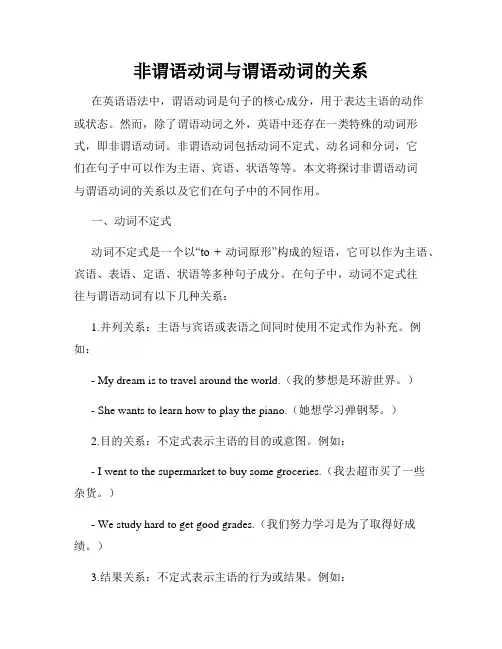
非谓语动词与谓语动词的关系在英语语法中,谓语动词是句子的核心成分,用于表达主语的动作或状态。
然而,除了谓语动词之外,英语中还存在一类特殊的动词形式,即非谓语动词。
非谓语动词包括动词不定式、动名词和分词,它们在句子中可以作为主语、宾语、状语等等。
本文将探讨非谓语动词与谓语动词的关系以及它们在句子中的不同作用。
一、动词不定式动词不定式是一个以“to + 动词原形”构成的短语,它可以作为主语、宾语、表语、定语、状语等多种句子成分。
在句子中,动词不定式往往与谓语动词有以下几种关系:1.并列关系:主语与宾语或表语之间同时使用不定式作为补充。
例如:- My dream is to travel around the world.(我的梦想是环游世界。
)- She wants to learn how to play the piano.(她想学习弹钢琴。
)2.目的关系:不定式表示主语的目的或意图。
例如:- I went to the supermarket to buy some groceries.(我去超市买了一些杂货。
)- We study hard to get good grades.(我们努力学习是为了取得好成绩。
)3.结果关系:不定式表示主语的行为或结果。
例如:- He ran so fast as to break the record.(他奔跑得如此快以至于打破了纪录。
)- The thief climbed over the wall to escape.(小偷翻过墙逃跑。
)二、动名词动名词是动词加上-ing形式构成的名词,它可以作为主语、宾语、表语、定语、状语等多种句子成分。
在句子中,动名词与谓语动词的关系有以下几种:1.主语关系:动名词作为句子的主语。
例如:- Swimming is good for your health.(游泳对身体有好处。
)- Reading is my favorite hobby.(阅读是我的最爱爱好。
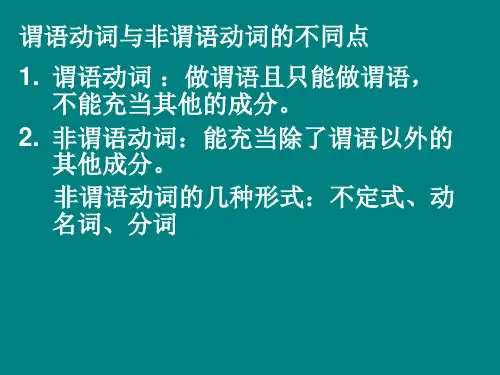

1.非谓语是什么?2.什么时候英语的句子要用到非谓语?3.非谓语在句中能充当什么成分?(主,谓,宾...)4.非谓语有几种基本形式,用在什么场合?5.Doing 这种形式在句子中,能充当什么成分?6.Doing 有几种形式变化,有什么区别,分别用在什么场合?非谓语形式:to do, do ing , do ne(规则动词+ed)1.Doing 的各种形式变化主动被动一般式doing Being done 完成式Having done Having been done want, need, require+doing=to be done, be worth doing 主动表被动2. To do 的各种形式主动被动一般式To do To be done 完成式To have done To have been done easy, difficult, hard + to do主动表被动The work is easy to do. To blame 主动表被动who is to blame for it?3. Done没有形式变化(not)To do (not)Doing Done状语多表示目的或是意外(only to)的结果To make fiendseasily, you needto be kind.I arrived thereonly to find thefilm hadfinished.常有搭配In order(not) to/so as (not)to dosth除了目的和意外的结果之外,多表示时间,原因,顺其自然的结果,伴随,条件(if)等如:Being really tired,he went home.(原因)He stand there,waiting for thebus.(伴随)Having finishedhis task, he went tobed.(时间)注意:Doing的逻辑注意,和主句的主语需要一致,如果不一样,就不能省略e.g. Entering thehouse, the windowwas found broken.除了目的和意外的结果之外可以表示时间,原因,伴随,条件等等Seen fromabove, theold town isverybeautiful.时间Frightenedby the noiseoutside,they all runbackhome.(原因)The ladyreturnedhome,followed byher son.伴随作主语强调一次性,具体动作强调概念,抽象不做主语作宾语常见的动词:She refused tohelp me.注:My dog can doeverything but(to) speak,动词的宾语:delay, enjoy…注意:在动词forget, remember,regret,try, mean, goon, stop, be used to,can’t help 之后用动名词与不定式意义不同allow, permit,advise, forbid 时搭配不做宾语定语名词或代词前面常有only,first, last, next,序数词,或形容词最高级:The last one toarrive pays thebell.单个doing 作定语放在修饰词的前面,如 a waitingroom...,doing短语放在修饰词后面the manwaiting for bus ismy friend. 相当于作定语,强调被动关系,没有明确的时间性,或时间上已经完成如: aboiled定语从句water,A developedcountry宾语补足语Ask sb to do注意:感官动词see …与使役动词,make let have通常省略to,如see sb dosth, make sb dosth, 变成被动形式,要还原to, 如:sb beseen to do希望某人做某事:expect sb todo sth, 而不用hope或wish1.感官动词后seehear watch noticefeel如,see sb doingsth 看到某人正在做某事,与接省略to的不定式区别在于:seesb do sth 看到某人做了某事,强调看到全过程2.使役动词keep,leave, find, catch,get, have后,并表示主动时如: Icatch Tom smokingin the toilet.可以在see,hear,notice,watch,keep, find,feel, have,make, get等动词后面做补足语:I found mybag stolen.I saw thepenrepaired.。
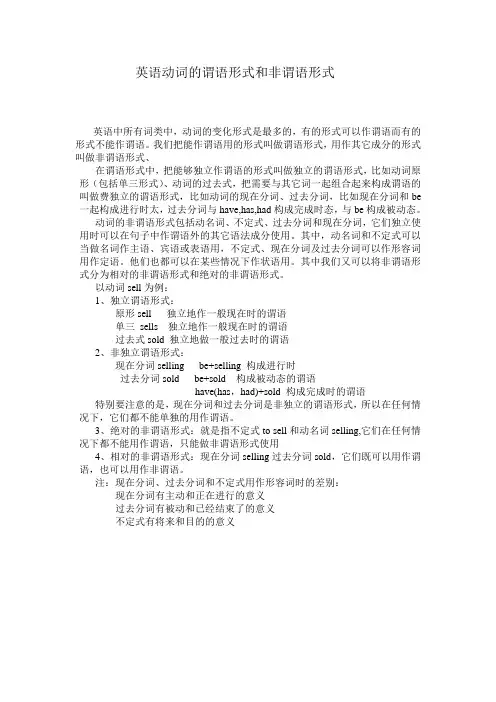
英语动词的谓语形式和非谓语形式英语中所有词类中,动词的变化形式是最多的,有的形式可以作谓语而有的形式不能作谓语。
我们把能作谓语用的形式叫做谓语形式,用作其它成分的形式叫做非谓语形式、在谓语形式中,把能够独立作谓语的形式叫做独立的谓语形式,比如动词原形(包括单三形式)、动词的过去式,把需要与其它词一起组合起来构成谓语的叫做费独立的谓语形式,比如动词的现在分词、过去分词,比如现在分词和be 一起构成进行时太,过去分词与have,has,had构成完成时态,与be构成被动态。
动词的非谓语形式包括动名词、不定式、过去分词和现在分词,它们独立使用时可以在句子中作谓语外的其它语法成分使用。
其中,动名词和不定式可以当做名词作主语、宾语或表语用,不定式、现在分词及过去分词可以作形容词用作定语。
他们也都可以在某些情况下作状语用。
其中我们又可以将非谓语形式分为相对的非谓语形式和绝对的非谓语形式。
以动词sell为例:1、独立谓语形式:原形sell 独立地作一般现在时的谓语单三sells 独立地作一般现在时的谓语过去式sold 独立地做一般过去时的谓语2、非独立谓语形式:现在分词selling be+selling 构成进行时过去分词sold be+sold 构成被动态的谓语have(has,had)+sold 构成完成时的谓语特别要注意的是,现在分词和过去分词是非独立的谓语形式,所以在任何情况下,它们都不能单独的用作谓语。
3、绝对的非谓语形式:就是指不定式to sell和动名词selling,它们在任何情况下都不能用作谓语,只能做非谓语形式使用4、相对的非谓语形式:现在分词selling过去分词sold,它们既可以用作谓语,也可以用作非谓语。
注:现在分词、过去分词和不定式用作形容词时的差别:现在分词有主动和正在进行的意义过去分词有被动和已经结束了的意义不定式有将来和目的的意义。

语法填空中的谓语与非谓语动词之判断广州市第65中方翠苗教学内容:高考语法填空中的谓语及非谓语动词的辨析。
教学目标:1.通过句型梳理与练习,使学生在具备分析句子结构的能力的基础上,掌握动词的时态和语态的相关知识。
?2.通过句型梳理与练习,使学生在具备分析句子结构的能力的基础上,掌握非谓语的相关知识。
?3.通过学习,使学生能辨析语法填空中的谓语及非谓语,并能进行准确填空,提高高考语法填空平均分。
4.学会同学间的合作学习和探讨式学习。
★——Difficult ★★——Very Difficult课前准备一.分析句子结构,找出句中的主谓结构及非谓语形式。
1. World emissions have risen by about 70% since the 1970s.2. Walking 10 kilometers every day is a challenging game for a normal person.3. It affects man's spirit and makes them more likely to suffer from disease.4. Many years ago there lived a very rich man who wanted to do something for the people of his town.5. The survey conducted by the club shows that many people want to take exercise for one hour every day.二.认真阅读下面文章,在理解文章意义的基础上分析划线部分的句子结构(找出谓语和非谓语结构)。
One day a rich man took his son on a trip to the country. He wanted to show his son how the poor lived so he could be thankful for his wealth. They spent a couple of days and nights on the farm of what would be considered a poor family. On their return the father asked his son to explain what he had learnt. The boy, who had remained silent and deep in thought on the journey home,replied in a way that shocked his father.The boy said he wanted to become a farmer. He envied the farmers who had the beautiful night stars to give them light while his family had only expensive lanterns. He wished to have a farm where he could go swimming in an endless river instead of the garden pool in their home. Finally he asked his father, "What makes us safer, large walls around our house or friends that will protect us?"The boy finished by saying, " Before the trip I thought we were rich but today I learnt who is truly rich. "With this the boy got up and walked away, leaving his father sitting on their comfortable sofa, totally speechless.(2009广州一模)课堂练习Task 1. 请做下面一组题,每做一题都要思考是如何一步一步做出来的,并将解题的思维过程说出来。
什么叫谓语动词和非谓语【谓语动词】指的是在句子中可以单独作谓语的动词,主要由实意动词充当。
另外,be动词和某些动词短语也可以是谓语动词。
助动词,情态动词不能单独作谓语,只能协助主要动词一起构成谓语动词,因此不在谓语动词的范畴。
【非谓语动词】是指在句子中不是谓语的动词,主要包括不定式、动名词和分词(现在分词和过去分词),即动词的非谓语形式。
非谓语动词除了不能独立作谓语外,可以承担句子的其他成分。
【谓语动词】与【非谓语动词】区别1)谓语动词在句中可单独作谓语,而非谓语动词不能单独作谓语。
MissMaryteachesusEnglish.玛丽教我们英语。
(teaches动词作谓语)Mr.Victorcametoourclassroomtohaveatalkwithuslastweek.维克托先生上周来我们教室和我们谈话。
(tohaveatalk....不定式作目的状语)2)谓语动词受主语的人称和数的限制,而非谓语动词形式没有这种限制。
Larkelikesthepopmusic.拉克喜欢流行音乐。
(动词用单数第三人称形式,作谓语)Larkehasnothingtodotoday.拉克今天没什么事要做。
(do用原形,补充说明nothing)非谓语动词的特征1如果非谓语动词是及物动词,后面须跟宾语。
StudyingEnglishismyfavorite.学习英语是我的爱好。
(studying后跟宾语)Tohelphimismyduty.帮助他是我的责任。
(help后跟宾语)2非谓语动词可以带有自己的状语或逻辑主语。
Workingundersuchaconditionisterrible.在这样的环境下工作太可怕了。
(undersuchacondition是working的状语)It'stoodifficultforhimtomasterEnglishinsuchashorttime.(forhim作不定式的逻辑主语)他在这么短的时间内掌握英语太难了。
谓语动词与非谓语动词辨析作者:周维娇来源:《学校教育研究》2018年第23期非谓语动词一直是高中英语语法中的重难点,经过多年的英语学习,不少同学对其已经有了一定的了解,知道了非谓语动词各种形式所代表的含义,但在实际运用中,尤其是语法填空题型里遇到长难句,困惑他们的往往是空格处到底是该填动词的谓语形式还是非谓语形式,如Recently a survey_____ (compare) prices of the same goods in two different supermarkets caused heated debate among citizens.答案为 comparing,此题的关键点是学生要能辨别出caused是充当的谓语,compare就需要填它的非谓语形式,主体结构是“A survey caused debate”。
但是很多学生会误认为caused是非谓语形式,而填成compared。
所以如何辨析谓语动词与非谓语动词就显得至关重要。
一、从概念上区分一是谓语(predicate verb)是句子中的必不可少的成分(在汉语中一个句子可能没谓语,但在英语中一个句子必须有谓语,是动词在句子中充当的谓语成分),是对主语动作或状态的陈述或说明,指出“做什么”“是什么”或“怎么样”。
谓语动词的位置一般在主语之后,谓语由简单动词或动词短语(助动词或情态动词+主要动词)构成,可分为两类:1.简单谓语——由一个动词或短语动词构成的谓语如We all make mistakes sometimes.The airplane takes off at 7.2.复合谓语由两部分构成,其有不同的情况1)由情态动词加动词原形构成These students must obey all the rules.2)由连系动词加表语构成,说明主语的动作,状态或特征My father grew old.二是非谓语动词(the Non-Finite Verbs)与谓语动词是相对的概念,是在句子中充当除谓语以外的各种句子成分的动词形式。
非谓语动词之动名词和不定式的辨析非谓语动词是指在句子中作宾语、状语、定语等成分时,不以谓语动词形式出现的动词形式。
其中,动名词和不定式是非谓语动词的两种常见形式。
本文将对动名词和不定式进行辨析,明确它们的用法和区别。
一、动名词动名词是由动词+ing构成的名词形式,具有名词的特征,可作主语、宾语、表语、宾补或介词宾语等。
作为非谓语动词,动名词可以表示动作、状态或者具体事物。
1. 动名词作主语- Smoking is harmful to health.(抽烟对健康有害。
)- Jogging in the park is a good way to relax.(在公园慢跑是一种很好的放松方式。
)2. 动名词作宾语- He enjoys swimming in the ocean.(他喜欢在海洋中游泳。
)- She avoids eating junk food.(她避免吃垃圾食品。
)3. 动名词作表语/宾补- Her favorite hobby is dancing.(她最喜欢的爱好就是跳舞。
)- I found him sleeping in the library.(我发现他在图书馆里睡觉。
)4. 动名词作介词宾语- He is tired of waiting for the bus.(他厌倦了等公交车。
)- She is good at playing the piano.(她擅长弹钢琴。
)二、不定式不定式是由"to + 动词原形"构成的形式,具有动词和名词的特征,可作主语、宾语、表语、宾补和定语等。
作为非谓语动词,不定式可以表示目的、原因、结果和程度等。
1. 不定式作主语- To learn a new language requires patience and persistence.(学习一门新语言需要耐心和坚持。
)- To succeed in life is everyone's ultimate goal.(在生活中取得成功是每个人的终极目标。
非谓语动词的用法与区别非谓语动词是指在句子中以动词形式出现,但不作谓语的动词形式。
它包括不定式、动词-ing形式和动词-ed形式。
非谓语动词在句子中充当各种成分,如主语、宾语、表语、定语和状语等。
它们与谓语动词有一些区别和用法上的差异。
本文将详细介绍非谓语动词的用法和区别。
一、不定式不定式是非谓语动词中最常见的形式之一。
它的基本结构为“to + 动词原形”,可以用来表示目的、结果、原因、方式等。
不定式可以作主语、宾语、表语、定语和状语。
1. 作主语例:To learn a foreign language is not easy.(学一门外语不容易)2. 作宾语例:I want to go shopping.(我想去购物)3. 作表语例:My dream is to become a doctor.(我的梦想是成为一名医生)4. 作定语例:I have a lot of books to read.(我有很多书要读)5. 作状语例:He comes to help us.(他过来帮助我们)二、动词-ing形式动词-ing形式是非谓语动词的另一种形式。
它的基本结构为动词原形+ing,可以作主语、宾语、表语、定语和状语。
1. 作主语例:Swimming is good for health.(游泳对健康有益)2. 作宾语例:I enjoy reading books.(我喜欢读书)3. 作表语例:His favorite activity is playing basketball.(他最喜欢的活动是打篮球)4. 作定语例:The running water sounds like music.(流动的水听起来像音乐)5. 作状语(表示时间、原因、方式等)例:She fell asleep while watching TV.(她看电视的时候睡着了)三、动词-ed形式动词-ed形式是非谓语动词中的一种形式,通常表示被动、完成等含义。
非谓语动词与动词辨析 1.—I’d like to buy an expensive sports car. —Well,Mike,we have got several models _____ . A.to be chosen from B.to choose C.to choose from D.for choosing 2.In the busiest season the farmers are seen _____ their tractors from morning till night. A.to have;working B.have;work C.have;working D.had;worked 3. _____ the meeting room,he found all the parents a1ready _____ there. A.To enter;sitting B.Stepping into;to seat C.Entered;seat D.Entering;seated 4.I spoke to my friend in a very 1ow voice _____ by anybody else. A.so as not to be heard B.so as to not to hear C.so not to hear D.so as to not be heard 5.Did you notice anyone _____ my room just now? A.enter into;Nobody B.entering;None C.to enter;None D.enter.N0 one 6.The boy pretended _____ when his mother entered. A.reading B.to read C.to be reading D.being read 7.When _____ medicine,please follow these instructions carefully. A.to take B.taking C.taken D.he takes 8.The classroom is so dirty that it needs _____ badly. A.clean B.to clean C.being cleaned D.cleaning 9.This is one of the experiments _____ in our laboratory. A.being made B.making C.to make D.having make 10.Do you remember _____ me somewhere before? A.to meet B.met C.meeting D.meet 11. _____ more time,the job can be done better. A.Given B.Giving C.To give D.To be given 12.The meeting _____ this evening is of great importance. A.holding B.held C.to hold D.to be held 13.In spite of his broken English,he can make himself _____ A.understood B.understanding C.understand D.to understand 14.The speech was very _____ ,and we were to tears. A.moved;moved B.moving;moving C.moving;moved D.moved;moving 15.Charles Babbage is generally considered _____ the first computer. A.to invent B.inventing C.having invented D.to have invented 16. _____ ,I went to the railway station to see my friend off. A.After eating quickly my dinner B.After my qujckly eating dinner C.After eating my dinner quickly D.After eating my quickly dinner l7.Mr Smlith wanted his daughter _____ after drinking. A.never to drive B.to never drive C.never driving D.never drive 18.My son isn’t feeling well,so I’ll get him _____ in the hospital. A.examined B.examining C.to examine D.examine 19.The secretary worked late into the night, _____ a long speech for the president. A.to prepare B.preparing C.prepared D.was prepared 20.I can hardly imagine Peter across the Atlantic 0cean in five days. A.sail B.to sail C.sailing D.to have sailed 21.—How do you deal with the disagreement between the company and the customers? —The key _____ the problem is to meet the demand by the customers. A.to solving;making B.to solving;made C.to solve;making D.to solve;made 22.John was made _____ the truck for a week as a punishment. A.to wash B.washing C.wash D.to be washing 23.Little Jim should love _____ to the theatre this evening. A.to be taken B.to take C.being taken D.taking 24.—I usually go there by train. —Why not _____ by boat for a change? A.to try going B.trying to go C.to try and go D.try going 25.I would appreciate _____ back this afternoon. A.you to call B.you call C.your calling D.you’re calling 26. _____ a reply,he decided to write again. A.Not receiving B.Receiving not C.Not having received D.Having not received 27.“Can’t you read?”Mary said _____ to the notice. A. angri1y pointing B.and point angrily C.angrily pointed D.and angrily pointing 28.How about the two of us _____ a walk down the garden? A.to take B.take C.taking D.to be taking 29.The computer centre, _____ last year,is very popular among the students in this schoo1. A.open B.opening C.having opened D.opened 30.The man _____ on now is my brother. A.to be operated B.being operated C.operated D.been operated 31.The visiting Minister expressed his satisfaction with his talks,_____ that he had enjoyed his stay here.
A.having added B.to add C.adding D.added 32.The first textbooks _____ for teaching English as a foreign 1anguage came out in the 16th centry. A.have written B.to be written C.being written D.written 33.Let the work _____ as soon as possible. A.was done B.be done C.to be done D.is done 34.The 0lympic Games, _____ in 776 B.C,did not include women players until 1912. A.first played B.to be first played C.first playing D.to be first playing 35.When I got back home I saw a message pinned to the door,_____ “Sorry to miss you;will call later.” A.read B.reads C.to read D.reading 36.I’ve worked with children before.so I know what _____ in my new job. A.expected B.to expect C.to be expecting D.expects 37.The managers discussed the plan that they would like to see _____ the next year. A.carry out B.carrying out C.carried out D.to carrv out 38.Do you know such problems? A.how to deal with B.what to deal with C.how to do with D.to do with 39 The lady said she would buy a gift for her daughter with the _____ . A.20 dollars remained B.20 dollars to remain C.remained 20 dollars D.remaining 20 dollars 40.He spent me an E-mail, to get further information. A.hoped B.hoping C.to hope D.hope 41.It is said in Australia there is more land than the government knows _____ . A.it what to do with B.what to do it with C.what to do with it D.to do what with it 42.Be careful when you cross this very busy street.If not,you may _____ run over by a car. A.have B.get C.become D.turn 43.We thought of selling this old furniture,but we’ve decided to _____ it.It might be valuable. A.hold on to B.keep up with C.turn to D.1ook after 44.—Mummy,can I put the peaches in the cupboard? —No,dear.They don’t _____ well.Put them in the bridge.instead. A.keep B.fit C.get D.last 45.His mother had thought it would be good for his character to _____